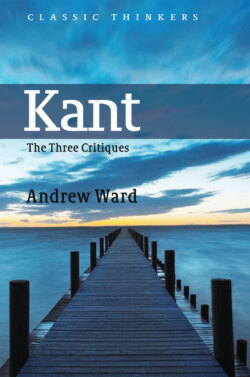Читать книгу Kant - Andrew Ward - Страница 25
Time is a pure (or a priori) intuition
ОглавлениеAs Kant’s arguments for the nature of time run parallel to those for space, I shall not discuss them in detail, but merely summarize them. The importance of time to his Copernican revolution will emerge properly only later, when we examine the proofs for the fundamental laws of pure natural science and the conditions of our own continued self-consciousness.
In the Metaphysical Exposition of time, it is first argued that time is a priori, in that it is not dependent upon our experiences but is, rather, a precondition of our having any experience at all. Time contains only relations, three of them: ‘succession, coexistence, and that which is coexistent with succession, the enduring’ (B 67). What this comes to is that everything that appears to us, whether in space or as a mere modification of the subject’s own thoughts, must do so under the aspect of time, and in accordance with one or more of these three time relations. For instance, when we experience spatial objects, and their states, we must always perceive them as coexisting or in succession (with their substance remaining – enduring – throughout any change). But our empirical consciousness of any instance of these relations itself presupposes our recognition of a single temporal continuum within which the apprehended sensations can be related. We cannot, therefore, derive our concept of time empirically, i.e. from the experience of coexistence or succession; rather, the experience of these relations always presupposes our recognition of time. Moreover, while we cannot be conscious of an appearance except under the aspect of time, we can think of time as empty of appearances – as in the imaginative construction of an arithmetical proof. Hence, time cannot be derived from our empirical intuitions, but must underlie them as an a priori condition.
It is argued, second, that time is an a priori intuition and not a general concept. For different times are necessarily all parts of one and the same temporal continuum, and time is also thought of as boundless or unlimited in extent. These are characteristics which, as Kant had maintained in his analogous discussion of space, can be given only through a priori intuition, and not by means of a general concept.
In the Transcendental Exposition of time, he again concludes, independently of the above considerations, that time must be an a priori intuition. For if, and only if, it is, can we explain our possession of certain synthetic a priori judgments which refer to temporal relations. Time makes possible the synthetic a priori body of propositions that is arithmetic: ‘arithmetic creates its concept of number by successive addition of its units in time [i.e. one after the other]’ (Prol, Sect. 10; 4:283). It also makes possible that a priori body of propositions dealing with pure mechanics, viz. by making possible the concept of motion: ‘Only in time can two contradictory opposed predicates (being in two different places) meet in one and the same object, namely one after the other.Thus our concept of time explains that body of a priori synthetic knowledge which is exhibited in the doctrine of motion’ (B 49; italics original).The point that Kant is making in these passages is this. If time were attached to things in themselves, absolutely or relationally, then the synthetic a priori judgments in arithmetic and mechanics could not be known to hold for relations in time (but only for relations in our inner intuition). For we prove them by recourse to the form of our inner intuition, as in the construction of an arithmetical sum. Whereas, if time is equated with the form of our inner intuition, we have no difficulty in understanding how such synthetic a priori judgments are possible. Now since it is certain that we are in possession of these judgments, and that they do hold for relations in time, it follows that time must be equated with the a priori form of our inner intuition.
The results of Kant’s arguments can be summarized as follows. Time is the a priori form of our inner intuition (or inner sense). It is also the form of intuition in which every appearance without exception must be located, whether the appearance is additionally referred to outer sense (and so to space) or whether it is only located in inner sense (and so in time). Everything that appears to us is constituted of representations; and all representations are mental phenomena. But while some appearances are conceived merely as belonging to the subject’s own inner states, the form of which is time, others are also referred to outer sense, the form of which is space. Yet, since all appearances are in time, as the form in which the subject apprehends any manifold of representations as an appearance, it follows that all appearances, whether referred to outer sense or to inner sense (as a modification of the subject’s thoughts) must be in time:
Time is the immediate condition of inner appearances (of our souls), and thereby the mediate condition of our outer appearances. Just as I can say a priori that all outer appearances are in space, and are determined a priori in conformity with the relations of space, I can also say from the principle of inner sense, that all appearances whatsoever, that is all objects of the senses, are in time, and necessarily stand in timerelations. (A 34/B 51)
